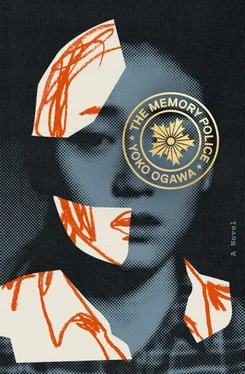. . .
The hand that had written the story, my eyes overflowing with tears, the cheeks that had received them—they all disappeared in their turn, and in the end all that was left was a voice. The citizens of the island had lost everything that had a form, and our voices alone drifted aimlessly.
I no longer needed to fall into R’s arms to descend to the hidden room. There was no need to lift the heavy trapdoor, since I was now able to slip through the narrow crack around it. In that sense, the complete disappearance of my body was actually a form of liberation. Still, if I was not careful, my unreliable and invisible voice might be swept away with the wind.
“It’s peaceful with just a voice,” I said. “With just a voice, I think I’ll be able to accept my final moment calmly and quietly, without suffering or sadness.”
“You mustn’t think like that,” R said. I could tell that he wanted to reach his arms toward me, but he remained still. With nowhere to go, his hands seemed to float before him.
“You’ll finally be able to leave here,” I told him. “You’ll be free to return to the outside world. The Memory Police have given up their hunt. Of course, how could they go on hunting people who are no more than voices?” I wanted to smile but then I realized that it would be useless. “The outside world is in ruins, crushed under the weight of the snow, but you’ll manage. I know you’ll be able to melt the frozen world bit by bit, and I’m sure others who have been in hiding will come out to join you.”
“But none of it will mean anything if you’re not here with me.” He seemed to be trying to caress my voice.
“I’m afraid I won’t be able to be with you.”
“Why do you say that?”
He reached out and grabbed at the air where he imagined my voice to be, but he missed the mark. Still, I could feel the warmth of his body.
The air current in the room changed directions, and, as though at that signal, my voice began slowly to disappear.
“Even when I’m gone, you must take care of this room. I hope my memory will live on forever here, through you.”
It was becoming more difficult to breathe. I looked around. My body was now included among the objects arranged on the floor. I lay there between the music box and the harmonica, my two legs protruding at odd angles, my hands crossed on my chest, my eyes lowered. In the same way he had wound the spring on the music box or blown into the harmonica, I imagined R would now caress my body in order to call forth memories.
“Do you really have to go?” he asked, gathering to his chest the air he held in his hands.
“Good-bye…” The last traces of my voice were frail and hoarse. “Good-bye.”
For a very long time, he sat staring at the void in his palms. When at last he had convinced himself that there was nothing left, he let his arms drop wearily. Then he climbed the ladder one rung at a time, lifted the trapdoor, and went out into the world. Sunlight came streaming in for one moment but vanished again as the door creaked shut. The faint sound of the rug being rolled out on the floor came to me from above.
Closed in the hidden room, I continued to disappear.
Yoko Ogawa’s fiction has appeared in The New Yorker, A Public Space, Granta, and Zoetrope: All-Story. Since 1988 she has published more than twenty works of fiction and nonfiction and has won every major Japanese literary award. She lives in Tokyo.

What’s next on your reading list?
Discover your next great read!
_________
Get personalized book picks and up-to-date news about this author.
Sign up now.
Revenge
Hotel Iris
The Housekeeper and the Professor
The Diving Pool
This is a work of fiction. Names, characters, places, and incidents either are the product of the author’s imagination or are used fictitiously. Any resemblance to actual persons, living or dead, events, or locales is entirely coincidental.
Translation copyright © 2019 by Yoko Ogawa
All rights reserved. Published in the United States by Pantheon Books, a division of Penguin Random House LLC, New York, and distributed in Canada by Penguin Random House Canada Limited, Toronto. Originally published in Japan as Hisoyaka na kesshō by Kodansha, Ltd., Tokyo, in 1994. Copyright © 1994 by Yoko Ogawa.
Pantheon Books and colophon are registered trademarks of Penguin Random House LLC.
Library of Congress Cataloging-in-Publication Data
Names: Ogawa, Yoko, [date] author. Snyder, Stephen, [date] translator.
Title: The memory police / Yoko Ogawa ; translated from the Japanese by Stephen Snyder.
Other titles: Hisoyaka na kesshåo. English
Description: New York : Pantheon Books, 2019.
Identifiers: LCCN 2018057224. ISBN 9781101870600 (hardcover : alk. paper). ISBN 9781101870617 (ebook). ISBN 9780375715334 (open market).
Subjects: LCSH: Loss (Psychology)—Fiction. Memory—Fiction. Novelists—Fiction.
Classification: LCC PL858.G37 H5713 2019 | DDC 895.63/5—dc23 | LC record available at lccn.loc.gov/2018057224
Ebook ISBN 9781101870617
www.pantheonbooks.com
Cover image: (woman) Taxi/Getty Images
Cover design by Tyler Comrie
v5.4
ep













